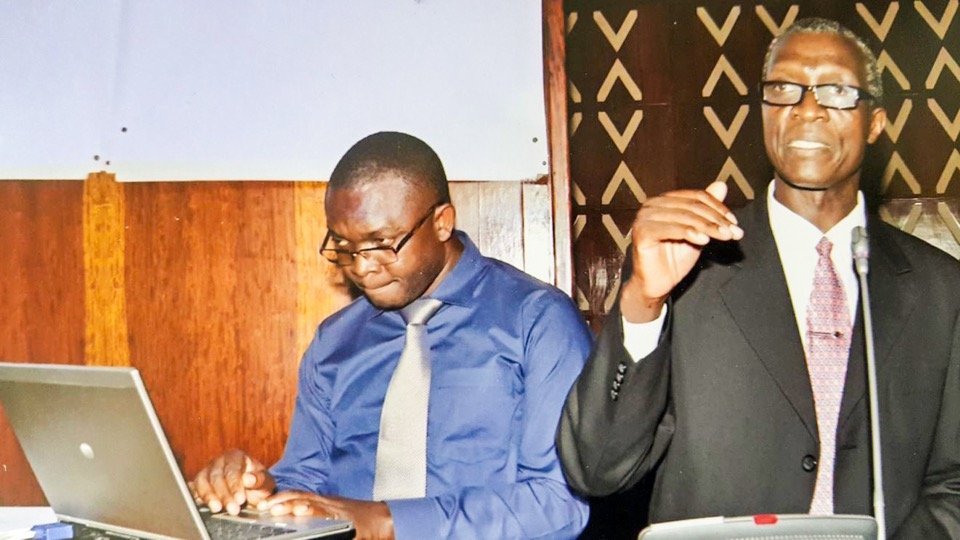ECOWAS Ministers approve partnership with ADEA for EMIS peer review in all member states and support for the African Education Fund


3rd October 2017 – Abidjan, Côte d’Ivoire: The Ministers of Education of the Economic Community of West African States (ECOWAS) resolved that all the region’s member states’ Education Management Information Systems (EMIS) be subjected to a peer review by ADEA using the regional Norms and Standards Assessment Framework, supported by the ECOWAS Commission in partnership with other key stakeholders. The Ministers also agreed to support the establishment of the African Education Fund (AEF) during their regional meeting held from 28th to 29th September 2017 in Lomé, Togo. This follows successful lobbying by ADEA’s officers in charge of programs (Ms. Raky Gassama and Mr. Youssouf Maiga from the Secretariat and Working Group on Education Management and Policy Support, respectively) during the experts meeting held earlier in the week in Abuja (Nigeria), and the presentation by the acting Executive Secretary, Mr. Shem Bodo, at the Ministerial meeting.
Eleven ministers from the basic and higher education ministries (i.e. Benin, Burkina Faso, Côte d’Ivoire – 2, Ghana, Niger – 2, Guinea Bissau, Liberia, Sierra Leone and Togo) and three ministerial representatives from The Gambia, Guinea, and Senegal participated in this meeting, under the theme “better harmonisation of education system of the region and the development of human capital for a knowledge-based society”. Also in attendance were technical and financial partners that included AAU, ADEA, African Union, ANCEFA, APESS, ECOWAS Parliament, Education for All Coalition, IsDB, MESR, UNODC, Oxfam, SKILL “G”, UEMOA, UNESCO, UNICEF, WANEP and World Bank Group.
In his presentation to the Ministers, the acting Executive Secretary of ADEA highlighted the strong message of transformation from the ADEA 2017 Triennale, in particular around the five priority action areas of supporting the Sustainable Development Goal (SDG) 4 and Africa’s Agenda 2063 in terms of creating a new African school, revolutionising skills, learning to live together freely and in peace, and putting in place conditions as well as factors for success. He informed the meeting on the ongoing development of ADEA’s strategic plan 2018-2020 and the new business model. The acting Executive Secretary reiterated the importance of a region-wide EMIS peer review process to improve the quality of data for decision making, in line with the recommendation of the EMIS experts. He further appealed to the ECOWAS countries to improve their membership contributions to ADEA and to support the setting up of the African Education Fund (AEF) after the outcome of the ongoing feasibility study funded by the African Development Bank Group (AfDB), through the Government of Japan.
The ECOWAS Ministers resolved to place education as an emergency issue for the next 10 years in order to deal effectively with the region’s issues affecting the youth – Africa’s demographic dividend. Other decisions include establishing a specialist agency on quality assurance, mediation and curriculum reform for mutual recognition of degrees and equivalencies of certification; review of academic mobility programs; harmonisation of basic education to 9 years; ratification of the Addis Convention by all member states in the region; subscription to the World Bank’s African Centres of Excellence; demystifying and strengthening Science, Technology, Engineering and Math (STEM) uptake, especially for girls; popularizing vocational training; and advocating for innovative domestic funding mechanisms for education such as the Ghana Education Trust Fund.
During the partners meeting co-chaired by ADEA and UNESCO, the partners appreciated the ECOWAS Commission’s initiative to facilitate the inaugural interaction with the Ministers. In addition to making key recommendations, the partners called upon the Commission to organize a roundtable follow-up dialogue forum after the Lomé Ministerial meeting. On their part, the Ministers agreed to support partner initiatives such as:
- The World Bank on African Centres of Excellence
- ADEA on the setting up of the African Education Fund
- WACREN on improving internet connectivity and spreading the use of computers on campuses
- Expanding SAFE’s experience in all ECOWAS countries by sharing their model of support to the rural world
- APESS to strengthen pastoral education
- WANEP on Education for Peace
- UNODC against drugs and add Sexual Education in Schools
ADEA’s acting Executive Secretary, Mr. Bodo took advantage of the forum to network with some regional leaders. He held bilateral discussions with Liberia’s Assistant Minister for Education and agreed on a way forward regarding payment of the country’s membership arears. He also discussed with the Lead Education Specialist of the Islamic Development Bank (IsDB), Mr. Jawara Gaye, regarding the follow up consultation mission to IsDB in the first week of November 2017 on the African Education Fund. Mr. Bodo agreed to link the Deputy Executive Director of WANEP with the coordinator of the ADEA’s Inter-Country Quality Node on Peace Education (ICQN-PE) for collaborative activities on country de-radicalization and countering violent extremism. Finally, Guinea’s Director of Cabinet called on ADEA to provide greater support to the country.
For more information:
- Contact Mr. Shem Bodo, acting Executive Secretary, ADEA, s.bodo@afdb.org
- Visit the ECOWAS Commission website at www.ecowas.int
Media contact:
- Mr. Stefano De Cupis, Senior Communication Officer, ADEA, s.decupis@afdb.org